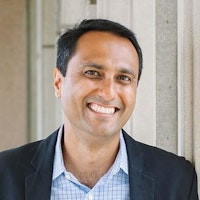To see the other side, to defend another people, not despite your tradition, but because of it, is the heart of pluralism.
Eboo Patel

The Heart of Pluralism
Topic: Interfaith Pathways
“To see the other side, to defend another people, not despite your tradition, but because of it, is the heart of pluralism.”
Eboo Patel
IslamFounder of Interfaith Youth Core
Acts of Faith
Patel, Eboo. Acts of Faith: the Story of an American Muslim, the Struggle for the Soul of a Generation. Beacon Press, 2007.

Eboo Patel
Resources
- Interfaith Youth Core, Eboo Patel, IFYC Founder and President
- Eboo Patel on Multiculturalism, Religious Diversity, and Global Learning ( Association of American Colleges & Universities Published on Sep 24, 2015)
- Eboo Patel, Acts of Faith: The Story of an American Muslim, the Struggle for the Soul of a Generation, goodreads website
- E.J. Dionne, Jr., Article on the Berkley Center website
Copyright © 2017 – 2024 LuminaryQuotes.com About Us

Acts of Faith Commentary, E.J. Dionne, Jr.
Muslims are constantly called upon to condemn violence. One who has done so consistently is Eboo Patel, an American whose argument in his book “Acts of Faith” parallels the lessons from Rabbi Sacks and Cardinal O’Malley.
“To see the other side, to defend another people, not despite your tradition, but because of it, is the heart of pluralism,” Patel writes. “We have to save each other. It’s the only way to save ourselves.”
This idea is worthy of the good news in Luke where an angel tells us: “Do not be afraid.”
–E.J. Dionne, Jr. [Article on the Berkley Center website].
Interfaith Leadership, Eboo Patel
Given this reality, I’d like to make a small proposal: Any college that promises to prepare global citizens has to take religious diversity seriously enough to educate their students to be interfaith leaders.
An interfaith leader is someone with the vision, knowledge base, and skill set to create the spaces, organize the social processes, and craft the conversations such that people of different religions can share a common life together. To begin with, interfaith leaders need a vision for a healthy religiously diverse democracy. They know that religion is about fundamental things; that diversity is not just about the differences you like but also the differences you don’t like; that democracy is not just about the opportunity to vote but the ability to make your personal convictions public. In such a society, conflicts are to be expected. A healthy religiously diverse democracy is a place where people who disagree on some fundamental things do so without violence and in a manner that allows them to work together on other fundamental things….
To build such societies, interfaith leaders require particular knowledge. To start, they need an appreciative knowledge of various religious, ethical, and philosophical communities. Appreciative knowledge goes beyond what is normally considered religious literacy (Which religion is the Bhagavad Gita associated with? What is the most populous Muslim-majority country?). It is a type of knowledge that attunes people to the contributions that various religious communities have made to the common good. It roughly parallels the approach that Black History Month or Women’s History Month takes — correcting for knowledge gaps by telling stories about exemplary figures like George Washington Carver and Elizabeth Cady Stanton. An appreciative knowledge about Muslims, for example, would highlight figures from Rumi to Muhammad Ali to Malala Yousafzai and illustrate how they embody core values in Islam.
–Eboo Patel [founder and president of Interfaith Youth Core and author of Interfaith Leadership: A Primer (Beacon Press, August 2016)].
Additional Eboo Patel Quotes:
“The tradition you were born into was your home, Brother Wayne [Teasedale] told me, but as Gandhi once wrote, it should be a home with the windows open so that the winds of other traditions can blow through and bring their unique oxygen. “It’s good to have wings,” he would say, “but you have to have roots, too.”
–Eboo Patel [Acts of Faith: The Story of an American Muslim, the Struggle for the Soul of a Generation].
“Even when we feel like we have found theological common ground—like Abraham as the patriarch of Jews, Christians, and Muslims—we quickly discover that even those paradigms have their limits. There are a million Hindus in this country, and over three million Buddhists, and neither of those communities would be called Abrahamic. But they live in America, too, and we have to have a paradigm that includes them.”
–Eboo Patel [Acts of Faith: The Story of an American Muslim, the Struggle for the Soul of a Generation].
“I realized that it was precisely because of America’s glaring imperfections that I should seek to participate in its progress, carve a place in its promise, and play a role in its possibility. And at its heart and at its best, America was about pluralism.”
–Eboo Patel [Acts of Faith: The Story of an American Muslim, the Struggle for the Soul of a Generation].